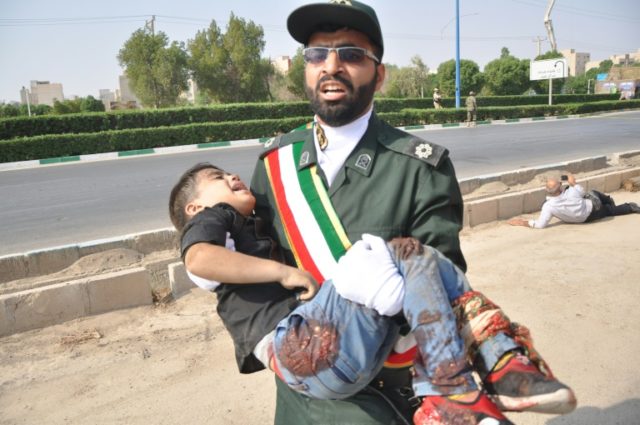Tehran (AFP) – Militants shot dead at least 24 people including women and children at a military parade in southwestern Iran on Saturday, state media reported, in a rare attack the government blamed on a US ally in the region.
There was no immediate claim of responsibility for the shooting rampage dubbed a “terrorist” attack by the authorities, in which at least 53 people were also wounded.
But Foreign Minister Mohammad Javad Zarif said he held a US ally in the region responsible.
“Terrorists recruited, trained, armed & paid by a foreign regime have attacked Ahvaz,” Zarif said in a tweet, adding: “Iran holds regional terror sponsors and their US masters accountable for such attacks”.
The deadly shooting targeted the city of Ahvaz in Khuzestan, a province bordering Iraq that has a large ethnic Arab community and has seen separatist violence in the past which Iran has blamed on its regional rivals.
“The number of martyrs of the terrorist incident reached 24, some of whom were women and children among the spectators,” IRNA said, adding the death toll could rise further as many of the wounded were in critical condition.
Armed forces spokesman Brigadier General Abolfazl Shekarchi said that the dead included a young girl and a former serviceman in a wheelchair.
“Of the four terrorists, three were sent to hell at the scene, while the fourth who had been wounded and arrested went to hell moments ago due to his severe wounds,” Shekarchi told state television.
Khuzestan deputy governor Ali-Hossein Hosseinzadeh told the semi-official ISNA news agency that a journalist was also among the dead. He also said earlier that “eight to nine” troops had been killed.
– Finger pointed at Riyadh –
Zarif did not specify which regional government he held responsible for the shooting, but Iran’s elite Revolutionary Guards said the attackers were funded by Sunni arch rival Saudi Arabia.
“Those who opened fire on civilians and the armed forces have links to the Ahvazi movement,” Guards spokesman Ramezan Sharif told ISNA.
“They are funded by Saudi Arabia and attempted to cast a shadow over the Iranian armed forces.”
Zarif vowed Iran would “respond swiftly and decisively in defence of Iranian lives”.
In a message of condolence to Russia’s close regional ally, President Vladimir Putin said he was “appalled by this bloody crime.”
“This event once again reminds us about the necessity of an uncompromising battle against terrorism in all of its manifestations.”
Khuzestan was a major battleground of the 1980s war with Saddam’s Iraq and the attack on the anniversary parade in Ahvaz had significant symbolic value.
The province saw unrest in 2005 and 2011 but has since seen been largely quiet.
Attacks by Kurdish rebels on military patrols along the border further north are relatively common.
But attacks on regime targets inside major cities are far rarer.
On June 7, 2017, 17 people were killed and dozens wounded in simultaneous attacks in Tehran on the parliament building and on the tomb of revolutionary leader Ruhollah Khomeini — the first inside Iran claimed by the Sunni Muslim extremists of the Islamic State group.
In April, 26 alleged IS jihadists went on trial on charges connected with that twin attack.
Police said that five people were arrested at the scene of the attacks and dozens more arrests were reported in the following months — many along the borders with Iraq and Turkey.
– Rouhani defiant –
The attack in Ahvaz came as Iranian President Hassan Rouhani was among the dignitaries at the main anniversary parade in Tehran.
In a keynote speech, Rouhani vowed to boost Iran’s ballistic missile capabilities despite Western concerns that were cited by his US counterpart Donald Trump in May when he abandoned a landmark nuclear deal with Tehran.
“We will never decrease our defensive capabilities… we will increase them day by day,” Rouhani said at a military parade. “The fact that the missiles anger you shows they are our most effective weapons,” he said, referring to the West.
Iran has ballistic missiles with a range of up to 3,500 kilometres (2,200 miles), enough to reach both Israel and US bases in the Middle East.
The United States reimposed crippling sanctions on Iran last month, and a new round of even harsher sanctions targeting Iran’s vital oil sector is set to go back into effect on November 5.
Washington has said it is ready to open talks on a new agreement to replace the July 2015 accord, but Tehran has said repeatedly it cannot negotiate under the pressure of the sanctions.
Trump and Rouhani will both be in New York next week for the United Nations General Assembly. But Iran has repeatedly ruled out any meeting.

COMMENTS
Please let us know if you're having issues with commenting.